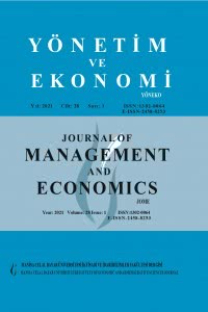A Research on the Demographic Reactions to the Usage of Essential Banking Services in Northern Cyprus
KKTC'de Temel Banka Hizmetlerine Yönelik Demografik Tepkiler Üzerine Bir Araştırma
___
- CASU,B., GIRARDONE, C. and MOLYNEUX, P. (2006), Introduction to Banking, Prentice Hall-Financial Times, England.
- DARCH, U. and CALTABIANO N. J. (2004), “Investigation of Automatic Teller Machine Banking in a Sample of Older Adults”, Australasian Journal on Ageing, 23 (2), pp. 100–103.
- EGEA, J.M.O, MENENDEZ, M.R. and GONZALEZ, M.V.R. (2007), “Diffusion and usage patterns of Internet services in the European Union”, Information Research, 12 (2).
- HARRISON, T. (200), Financial Services Marketing, Pearson Education Ltd., England.
- HEFFERNAN, S. (2005), Modern Banking, John Wiley & Sons, Ltd., England.
- HOWELLS, P. and BAIN, K. (2007), Financial Markets and Institutions, Fifth Ed., Prentice Hall-Financial Times, England.
- LİSANİLER, F. G. and SEVGİN UĞURAL (2001), “Occupational Segregation: The Position of Women in the North Cyprus Labor Market”, Woman 2000, Vol. II, Issue I, pp. 117-131.
- MCGOLDRICK, P.J. and GREENLAND, S.J. (1994), Retailing of Financial Service, McGraw Hill, England.
- MISHKIN, F.(2007), The Economies of Money, Banking and Financial Markets, 8th Edition, Pearson Addison Wesley Education, Boston.
- ROSE, P.S. and HUDGINS, S.C. (2005), Bank Management and Financial Services, Sixth Ed., McGraw Hill International Edition, Singapore.
- ŞAFAKLI, O. (2004), “Kuzey Kibrıs Türk Cumhuriyeti’nde (KKTC) Banka Krizlerinin Nedenleri ve Sonuçları Üzerine Bir Çalışma”,İktisat/İşletme ve Finans Dergisi, Yıl: 19, Sayı: 216, pp. 86-101.
- ONO, H. and ZAVODNY, M. (2002), Gender and the Internet, Federal Reserve Bank of Atlanta, Working Paper 2002-10, June 2002.
- TRNC CENTRAL BANK (2006), 2005 Year Report, Nicosia – Northern Cyprus.
- USTA, R. (2005), “A Study On The Reasons Of Why The Internet Banking Is Not Used Widely By Consumers”, Dogus University Journal, 6 (2): 279-290.
- ISSN: 1302-0064
- Yayın Aralığı: 4
- Yayıncı: Manisa Celal Bayar Üniversitesi İktisadi ve İdari Bilimler Fakültesi
“2000-2006 Döneminde Türkiye'de Faaliyet Gösteren Sigorta Şirketlerinin Etkinlik Değerlendirmesi”
Edip ÖRÜCÜ, Recep KILIÇ, Taşkın KILIÇ
2000-2006 Döneminde Türkiye'de Faaliyet Gösteren Sigorta Şirketlerinin Etkinlik Değerlendirmesi
Türkiye’de Kooperatiflerin Vergilendirilmesi
Esin FİRUZAN, O. Murat KOÇTÜRK, Ali Rıza FİRUZAN, Ayşe BAKKURT
“Türkiye'de Turizm Sektörü Teşviklerinin Değerlendirilmesi”
“Sürdürülebilir Kalkınmada İşletmenin Rolü: Kurumsal Vatandaşlık”
